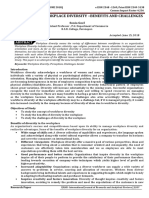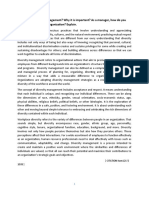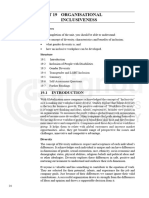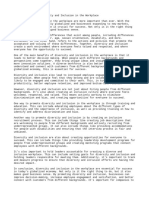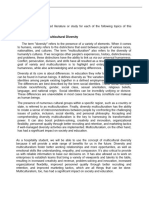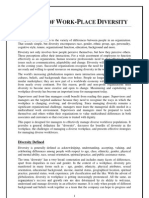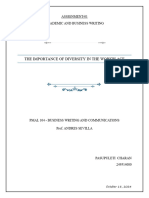Cultural Diresity
Cultural Diresity
Uploaded by
tafuchiyuuCopyright:
Available Formats
Cultural Diresity
Cultural Diresity
Uploaded by
tafuchiyuuOriginal Title
Copyright
Available Formats
Share this document
Did you find this document useful?
Is this content inappropriate?
Copyright:
Available Formats
Cultural Diresity
Cultural Diresity
Uploaded by
tafuchiyuuCopyright:
Available Formats
Essay 2: The Importance of Cultural Diversity in the Workplace
Cultural diversity in the workplace is not just a buzzword; it is a fundamental aspect of buildin
g a strong and inclusive organizational culture. When employees from diverse backgrounds
come together, they bring with them unique perspectives, experiences, and ideas that can dr
ive innovation and creativity. Moreover, a diverse workforce is better equipped to understand
and serve a diverse customer base, leading to improved customer satisfaction and business
performance.
One of the key benefits of cultural diversity in the workplace is increased innovation. When p
eople from different cultural backgrounds collaborate, they bring a variety of viewpoints to th
e table, which can spark creativity and lead to novel solutions to complex problems. Researc
h has shown that diverse teams are more likely to generate innovative ideas and outperform
homogenous teams in terms of productivity and performance.
Additionally, cultural diversity fosters a culture of inclusion and respect within the workplace.
When employees feel valued and respected for their unique backgrounds and perspectives,
they are more likely to feel engaged and motivated to contribute their best work. This, in turn,
leads to higher levels of employee satisfaction and retention, as employees are more likely t
o stay with organizations that prioritize diversity and inclusion.
However, achieving and maintaining cultural diversity in the workplace requires intentional ef
fort and commitment from organizational leaders. It involves creating policies and practices t
hat promote diversity and inclusion at all levels of the organization, from recruitment and hiri
ng to promotion and leadership development. It also requires fostering a culture of open com
munication and mutual respect, where employees feel comfortable expressing their ideas an
d perspectives without fear of judgment or discrimination.
In conclusion, cultural diversity is not just a moral imperative; it is also a strategic advantage
in today's globalized and interconnected world. By embracing diversity and creating inclusive
workplaces, organizations can unlock the full potential of their employees and drive innovatio
n, creativity, and business success.
You might also like
- Assignment 1 PmalDocument6 pagesAssignment 1 PmalcatchmeifyoucanraNo ratings yet
- ManuDocument56 pagesManuTanveer ShaikhNo ratings yet
- Control ProcessingDocument3 pagesControl ProcessingRahul ReddyNo ratings yet
- Creative People and OrganisationsDocument17 pagesCreative People and OrganisationstanvirNo ratings yet
- The Inclusive Leader: Embracing Diversity for Organizational ExcellenceFrom EverandThe Inclusive Leader: Embracing Diversity for Organizational ExcellenceNo ratings yet
- Cultural Diversity at Workplace NotesDocument57 pagesCultural Diversity at Workplace NotesChinnu PreranaNo ratings yet
- Garcia - Guiang - 11 FR 1Document13 pagesGarcia - Guiang - 11 FR 1Andre ObedozaNo ratings yet
- Workplace Diversity Vivek PDFDocument20 pagesWorkplace Diversity Vivek PDFVivek rathodNo ratings yet
- PresentationDocument4 pagesPresentationnimamojizNo ratings yet
- Diveristy Benefits and Challenges PDFDocument3 pagesDiveristy Benefits and Challenges PDFWako FredrickNo ratings yet
- Week 12 NotesDocument4 pagesWeek 12 NotesSaeed Ahmed ChacharNo ratings yet
- Purposive MidtermDocument10 pagesPurposive MidtermShain Soria FernandezNo ratings yet
- CDW I ST ChapterDocument8 pagesCDW I ST ChapterProfessorNo ratings yet
- HRM (Diversity Management)Document8 pagesHRM (Diversity Management)Vikram SahaNo ratings yet
- Slidesgo Embracing Cultural Diversity Unlocking The Power of Inclusion in The Workplace 20241111180213r1utDocument7 pagesSlidesgo Embracing Cultural Diversity Unlocking The Power of Inclusion in The Workplace 20241111180213r1utniharikabhatt03No ratings yet
- Diversity in WorkplaceDocument1 pageDiversity in WorkplaceMay ForeverNo ratings yet
- Unit 19Document23 pagesUnit 19Poonam SharmaNo ratings yet
- What Is Organizational Diversity?Document8 pagesWhat Is Organizational Diversity?khurram riazNo ratings yet
- Managing Workforce Diversity in 21st CenturyDocument15 pagesManaging Workforce Diversity in 21st CenturyNagendra Balaji100% (2)
- Business Policy of MMDocument2 pagesBusiness Policy of MMoONo ratings yet
- Assignment 02Document4 pagesAssignment 02Muazzam KhanNo ratings yet
- Workforce Diversity Management: Biggest Challenge or Opportunity For 21st Century OrganizationsDocument6 pagesWorkforce Diversity Management: Biggest Challenge or Opportunity For 21st Century Organizationsderrel251706No ratings yet
- Managing Diversity at WorkplaceDocument7 pagesManaging Diversity at WorkplaceSolomon PriceNo ratings yet
- The Business Case For Managing Cultural DiversityDocument10 pagesThe Business Case For Managing Cultural Diversityhapalo taigaNo ratings yet
- The Importance of Cultural Diversity in The Workplace - Thomas InternationalDocument2 pagesThe Importance of Cultural Diversity in The Workplace - Thomas InternationalAsdfgh Jklbhu100% (1)
- Diversity InitiativesDocument6 pagesDiversity Initiativesmukamiprudence725No ratings yet
- Essay 1: Cause & Effect: RevisionDocument3 pagesEssay 1: Cause & Effect: RevisionNoreen LagmanNo ratings yet
- Benefits of Cultural DiversityDocument2 pagesBenefits of Cultural Diversityzineb zinebNo ratings yet
- Equality and Diversity Assignment TwoDocument7 pagesEquality and Diversity Assignment TwoLusa Mulonga JkrNo ratings yet
- Multi ResearchDocument11 pagesMulti Researchrona032003No ratings yet
- Diversity Equity Inclusion and Belonging GuideDocument12 pagesDiversity Equity Inclusion and Belonging GuideNitu MarilenaNo ratings yet
- HRM Workplace DiversityDocument36 pagesHRM Workplace DiversityNeha Gulati100% (3)
- EMBRACING DIFFERENCES:Cultivating Inclusion in The Wrkplace of The FutureFrom EverandEMBRACING DIFFERENCES:Cultivating Inclusion in The Wrkplace of The FutureNo ratings yet
- Advantages of Cultural DiversiyDocument2 pagesAdvantages of Cultural DiversiyRafiaNo ratings yet
- Benefits and Drawbacks of Working in A Culturally Diverse WorkplaceDocument4 pagesBenefits and Drawbacks of Working in A Culturally Diverse WorkplaceEmna KallelNo ratings yet
- Unit-1 OEC People Management - EnglishDocument7 pagesUnit-1 OEC People Management - EnglishVeena ReddyNo ratings yet
- Alferez EstaDocument3 pagesAlferez EstaJelord Abalde AlferezNo ratings yet
- New Microsoft Word Document (3) OBDocument6 pagesNew Microsoft Word Document (3) OBRajeshKendheNo ratings yet
- ConclusionDocument2 pagesConclusionMayar WalidNo ratings yet
- Final Assignment - MDSTDocument8 pagesFinal Assignment - MDSTsharifakhonjNo ratings yet
- Strategies in Managing-Diversity-in-the-WorkplaceDocument9 pagesStrategies in Managing-Diversity-in-the-WorkplaceCherry Mae B GajeteNo ratings yet
- Diversity in OrganizationsDocument3 pagesDiversity in Organizationshanlinn.epNo ratings yet
- HRM Work Force DiversityDocument6 pagesHRM Work Force Diversityomi0025No ratings yet
- Corporate Culture EssayDocument2 pagesCorporate Culture Essayupamalama9No ratings yet
- October 2015 1446891355 02Document3 pagesOctober 2015 1446891355 02SonuNo ratings yet
- Charan PMALDocument6 pagesCharan PMALcatchmeifyoucanraNo ratings yet
- Tmhm10-Module 3Document5 pagesTmhm10-Module 3Angelika LastimadoNo ratings yet
- Sardual - Research Work and Journal WritingDocument11 pagesSardual - Research Work and Journal Writingleonajoysardual672No ratings yet
- Workplace Diversity and ProductivityDocument10 pagesWorkplace Diversity and Productivityayan.pgdm13ncNo ratings yet
- 1505108363module 17 Quad 1 Managing DiversityDocument14 pages1505108363module 17 Quad 1 Managing DiversityArpit GuptaNo ratings yet
- Assignment On Diversity in WorkplaceDocument15 pagesAssignment On Diversity in WorkplaceWahidul IslamNo ratings yet
- WUSTL-Essay-Qing GUODocument2 pagesWUSTL-Essay-Qing GUOyjiang2018No ratings yet
- Managing Diversity in The WorkplaceDocument12 pagesManaging Diversity in The WorkplaceLlover Cameros YapNo ratings yet
- Be 3Document4 pagesBe 3aamarnaths2021No ratings yet
- Managing Cultural Diversity in The WorkplaceDocument2 pagesManaging Cultural Diversity in The WorkplaceLorenz ValenciaNo ratings yet
- The Power of Diversity and Inclusion in The Workplace by Panos KalsosDocument2 pagesThe Power of Diversity and Inclusion in The Workplace by Panos KalsosPanos KalsosNo ratings yet
- This Presentation Explores The Relationship Between Innovation StrategyDocument2 pagesThis Presentation Explores The Relationship Between Innovation Strategypalakkathuria20No ratings yet
- Disadvantages of DiversityDocument11 pagesDisadvantages of DiversityMercelita CascanteNo ratings yet
- Quiz 3Document1 pageQuiz 3april JaimeNo ratings yet
- The Difference Between Diversity and Inclusion, and Why It MattersDocument4 pagesThe Difference Between Diversity and Inclusion, and Why It Mattersashutosh_parida_5No ratings yet









